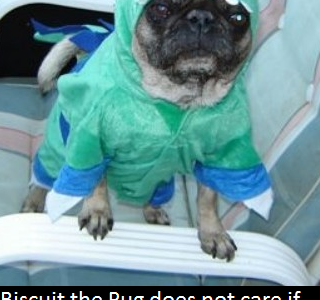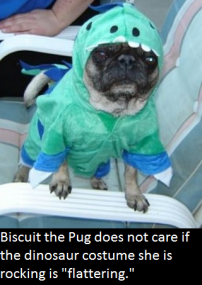 This is one of those annual tradition posts – it’s the Underpants Rule and it is pretty simple: when it comes to personal choices, everyone is the boss of their own underpants. So, when it comes to personal choices, you get to choose for you and other people get to choose from them and it’s not your job to tell other people what to do and it’s not their job to tell you what to do. To illustrate, if someone is considering saying something about personal choices that starts with
This is one of those annual tradition posts – it’s the Underpants Rule and it is pretty simple: when it comes to personal choices, everyone is the boss of their own underpants. So, when it comes to personal choices, you get to choose for you and other people get to choose from them and it’s not your job to tell other people what to do and it’s not their job to tell you what to do. To illustrate, if someone is considering saying something about personal choices that starts with
- People should
- Everyone ought to
- What people need to do
- We should all
- Nobody should
- You shouldn’t
- blah blah things that have to do with underpants that aren’t yours blah blah
then there is a 99.9% chance that they are about to break The Underpants Rule. Of course telling you that you should follow the Underpants Rule is, in fact, breaking the Underpants Rule which is pesky, so let me instead make a case for the Underpants Rule and then you can make your own choice.
I chose a Health at Every Size practice (knowing that health is not an obligation, barometer of worthiness, or entirely within our control) because I am a fan of research, logic and math. I think that the research clearly shows that a HAES practice gives me a much better shot at supporting my health with way less downside risk than a weight loss- based health practice.
There are people who think the exact opposite of that. I know that because they come here and tell me so – they say that I should make a different choice. This blog is my little corner of the internet. It exists only because I created it and I am thrilled to pieces that people enjoy reading it, that people get inspired by it, that it gives people information to make choices etc. I try very hard to make sure that I always follow the Underpants Rule and never tell anyone else how they have to live when it comes to their personal choices, and yet people come here and try to tell me how to live when it comes to my personal choices. That’s annoying.
For this reason, I would never go onto someone’s weight loss blog and tell them all about Health at Every Size and quote research as to why I think it’s a better choice. Those are not my underpants.
I do not enjoy (or believe them) when people tell me that I need to become smaller to be attractive. Therefore I would never say that thin women need to become larger to be attractive. Besides the fact that I don’t believe it, those are not my underpants. (Not to mention that the path to high self-esteem is probably not paved with hypocrisy so doing to someone else exactly what I don’t want done to me seems ill-advised.)
The “War on Obesity” is an underpants rule breakdown on a massive scale. A group of government, public and private interests (with various profit and political motivations) has chosen a group of people who are identifiable by sight and is now trying to tell us everything from how we have to prioritize health, to the path we have to take to become healthy, to how our bodies have to look. Who died and made them Underpants Overlord? Nobody. (And another year has gone by and I’ve still not received my official fat person pony.)
My metaphorical underpants and my actual underpants have something in common: if I want somebody else in them, that person will be among the very first to know. I have definitely not invited the executives at HBO, Kaiser Permanente, the government, or the diet industry into my underpants.
Over the years, there have been some misunderstandings about the Underpants Rule – mostly confusion about what is and is not covered, I wrote about the limitations of the UR here.
Now, I’m not telling what to do (cause, you know, Underpants Rule) but I’m suggesting that if you don’t like it when people attempt to be the boss of your underpants, then maybe take a pass on trying to be the boss of someone else’s. I’m fairly certain that “Do unto others exactly what you don’t want them to do to you” is the brick rule or the pile of crap rule or something – at any rate a LOT of steps down from platinum and gold.
Remember, you are forever the boss of your underpants – occupy your underpants (with a nod to reader Duckie for that phrase)! I’m going off to see if there is a Guinness World Record for number of times the word underpants is used in a blog.
Underpants. Underpants. Underpants.
Underpants.
Under…
…pants.
Like this blog? Here’s more cool stuff:
Become a Member! For ten bucks a month you can support fat activism and get deals from size positive businesses as a thank you. Click here for details
Book and Dance Class Sale! I’m on a journey to complete an IRONMAN triathlon, and I’m having a sale on all my books, DVDs, and digital downloads to help pay for it. You get books and dance classes, I get spandex clothes and bike parts. Everybody wins! If you want, you can check it out here!
Book Me! I’d love to speak to your organization. You can get more information here or just e-mail me at ragen at danceswithfat dot org!
I’m training for an IRONMAN! You can follow my journey at www.IronFat.com
If you are uncomfortable with my offering things for sale on this site, you are invited to check out this post.

 My sadness over the fact that
My sadness over the fact that This post is a danceswithfat tradition, offered for those who may have to deal with inappropriate friend and family behavior during this “holiday season” (whether they are celebrating any holidays or not.)
This post is a danceswithfat tradition, offered for those who may have to deal with inappropriate friend and family behavior during this “holiday season” (whether they are celebrating any holidays or not.)



 Khloé Kardashian has a new show called “Revenge Body.” The premise is “Let’s make our haters our biggest motivators” and to that end people who have been bullied are given a team of trainers and “beauty experts” to help them go to drastic measures to look like people they assume their bullies would not have bullied which, for Khloé, passes for “revenge.”
Khloé Kardashian has a new show called “Revenge Body.” The premise is “Let’s make our haters our biggest motivators” and to that end people who have been bullied are given a team of trainers and “beauty experts” to help them go to drastic measures to look like people they assume their bullies would not have bullied which, for Khloé, passes for “revenge.” The Toronto Transit Commission created a campaign about public transportation that juxtaposed public transportation backgrounds with dancers from the National Ballet of Canada.
The Toronto Transit Commission created a campaign about public transportation that juxtaposed public transportation backgrounds with dancers from the National Ballet of Canada.  I got this question from a blog reader:
I got this question from a blog reader: Every once in awhile a meme starts going around social media that says “You are not fat. You have fat. You also have fingernails. But you are not fingernails.” I’ve seen this in plenty of versions and I think it’s problematic on a lot of levels. It must be going around again because I’ve been getting a bunch of requests about it, so I’m re-posting my response.
Every once in awhile a meme starts going around social media that says “You are not fat. You have fat. You also have fingernails. But you are not fingernails.” I’ve seen this in plenty of versions and I think it’s problematic on a lot of levels. It must be going around again because I’ve been getting a bunch of requests about it, so I’m re-posting my response. People in the US are borrowing a
People in the US are borrowing a